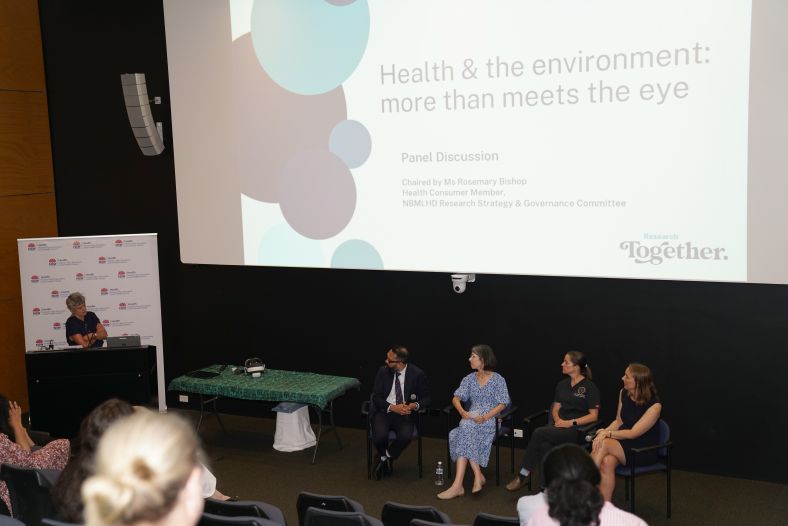NBMLHD Director of Research Operations, Dr Kelly Thompson says it’s been an incredible year for research at NBMLHD.
"The Research Together Showcase has highlighted the incredible depth and diversity of research being conducted at NBMLHD, with a clear focus on improving patient outcomes and service delivery in our community."
"It’s inspiring to see how our researchers are transforming their findings into real-world applications, driving both better health outcomes and more efficient healthcare delivery across the region."
Nepean Cardiopulmonary Research Program
Professor Sam Orde, Director of ICU at Nepean Hospital
The Nepean Cardiopulmonary Research Program is a joint venture with the ICU, Cardiology, and Respiratory Departments. Seven PhD students are involved in cutting-edge research, focusing on the application of non-invasive cardiac imaging techniques, such as echocardiography, for ICU and cardiology patients, as well as the role of mechanical ventilation in critically ill patients.
Additionally, the program is spearheading innovative projects, including the development of ‘mixed reality’ educational tools to enhance training for doctors and nurses in echocardiography, offering a promising approach to advancing clinical skills in this critical area.
Sex differences in Sepsis
Dr Kelly Thompson, Director of Research Operations
Director of Research Operations at NBMLHD, Dr. Kelly Thompson’s research shines a light on the importance of integrating gender and sex differences in healthcare.
Her findings reveal gender shapes identity and power dynamics, while biological sex affects disease patterns, immune responses, and treatment outcomes. This understanding is essential for precision medicine and social equality.
Historically, medical research has been male-centric, neglecting women and gender-diverse individuals, skewing health knowledge. Kelly advocates for inclusive research that addresses both biological and gender-related factors to improve health outcomes and reduce disparities across all genders.
Pain Smart
Dr Steven Kamper, Professor of Allied Health
Steve Kamper’s research focuses on chronic pain in children, a topic often underestimated in terms of its prevalence and impact.
Despite the long-held belief that pediatric pain is uncommon and short-lived, Kamper’s work challenges this notion, revealing its significant burden on children’s health and its links to mental health issues, smoking, alcohol use, and other conditions.
His research includes trials exploring pain education within school curriculums and biopsychosocial care for students with chronic pain. In collaboration with Sydney Catholic Schools, the study has developed educational modules and a case-managed care model.
Early trials revealed challenges in consent and engagement, but the program was well-received.
Kamper’s work aims to integrate chronic pain management into schools, train teachers, and provide comprehensive care for affected students, with plans to expand the research and provide practical tools for managing paediatric pain.
Operation Glucose
Dr Natassia Rodrigo, Endocrinologist at Nepean Hospital
Dr. Natassia Rodrigo's research looks at how losing weight before pregnancy affects both the mother and baby, focusing on a mouse model of obesity.
The study compared the effects of weight loss using a medication called liraglutide before pregnancy with making dietary changes during pregnancy. The findings showed that obesity in mothers reduced fertility and pregnancy outcomes, but liraglutide helped with weight loss, improved fertility, and better blood sugar control before pregnancy.
However, liraglutide didn’t prevent weight gain or blood sugar problems during pregnancy, the research showed dietary changes before pregnancy worked better for improving metabolic health.
This research helps guide better care for overweight mothers before pregnancy and suggests that both medication and diet changes could play important roles in improving outcomes for mothers and their babies.
Critical Care Physiotherapy
Dr Anwar Hassan, Senior Cardiorespiratory Physiotherapist at Nepean Hospital
Dr. Anwar Hassan’s research focuses on using Intrapulmonary Percussive Ventilation (IPV) to help critically ill patients breathe better and reduce their time in the ICU.
IPV uses a special device to deliver rapid breaths that help clear the airways, reduce lung collapse, and improve oxygen levels.
Dr. Hassan’s study, conducted at Nepean ICU, compared IPV with traditional chest physiotherapy for patients who weren’t on a ventilator. The results showed that IPV patients spent 1.5 days less in the ICU and had better oxygen levels and breathing rates.
While there were no differences in lung recovery, readmission, or death rates, the study showed that IPV is safe, effective, and could save costs by shortening ICU stays.
Dr. Hassan recommends using IPV routinely in ICUs and conducting more research to improve its use in critical care.
A paid exercise break from manuscript to policy
Dr Faraz Pathan, Cardiologist at Nepean Hospital
Dr. Faraz Pathan’s research is on the feasibility and impact of a paid exercise break program to improve employee health.
With obesity and physical inactivity being significant health issues globally, especially in areas like Penrith and Mount Druitt, Dr. Pathan’s study aimed to explore an incentivised workplace exercise program to encourage physical activity.
The 10-week pilot program at Nepean Hospital included activities like stair climbing, walking, and resistance training. Participants attended an average of 2.4 sessions per week and showed improvements in body composition and functional capacity.
The study found that the program was safe, feasible, and well-received. Dr. Pathan advocates for expanding the model to other businesses and regions, highlighting the need for more research and policy development to address obesity, physical inactivity, and other health disparities, particularly in areas with high socioeconomic disadvantage.
View Dr Faraz Panthan’s Tedx Talk on creating a health break.
From Evidence to Practice: Strengthening Paediatric Care through Collaborative Research
Associate Professor Habib Bhurawala, Head of Department of Paediatrics and Senior Staff Specialist at Nepean Hospital
A/Prof Habib Bhurawala’s research focuses on improving paediatric care through collaborative models, particularly in managing ADHD.
In partnership with the PHN, Nepean Paediatrics, and local GPs, Bhurawala addressed ADHD referral challenges. A survey of 230 GPs identified barriers like time constraints and limited knowledge. In response, a model was developed to refer stable ADHD patients back to GPs, with trained GPs managing care.
This has expanded capacity, with five GPs trained and 116 ADHD patients treated in general practice. Bhurawala plans to expand GP training, extend the model to adults, and replicate it in other regions.
Additionally, he is leading research on adolescent vaping, revealing gaps in GP knowledge about its health risks. In response, Bhurawala initiated educational sessions for GPs and is developing tailored resources to improve vaping care and outcomes.
Through these initiatives, A/Prof Bhurawala continues to drive meaningful improvements in paediatric care by translating evidence into practice.
Prostate Cancer Treatment - ProFocal
Dr Shravankrishna Ananthapadmanabhan, Resident Medical Officer at Nepean Hospital
Resident Medical Officer, Dr Shravankrishna Ananthapadmanabhan’s research, led by Urologist, Professor Celi Varol, focuses on a novel cooled focal laser ablation technique as a treatment for localised prostate cancer, known as ‘ProFocal’.
This trial aimed to assess the safety and efficacy of ProFocal, which uses cognitive or software fusion to target cancerous lesions with precision, while minimising damage to surrounding tissues.
The study, conducted at Nepean Hospital, involved 100 men with localised prostate cancer and monitored their oncological and functional outcomes post-treatment. Results showed promising early oncological outcomes, with 88% of patients experiencing failure-free survival at three months.
There was no significant worsening of urinary, bowel, or quality-of-life measures. The study concluded that ProFocal is a safe and effective focal therapy with excellent functional outcomes, though a learning curve was noted in achieving optimal results.

